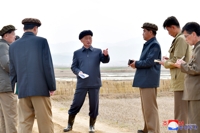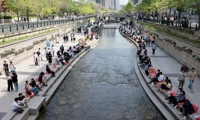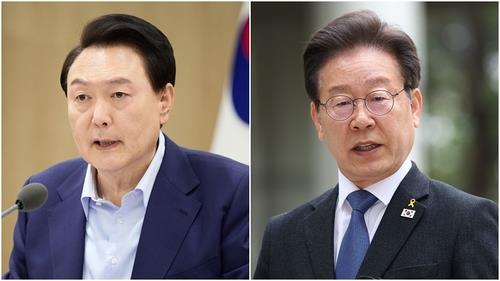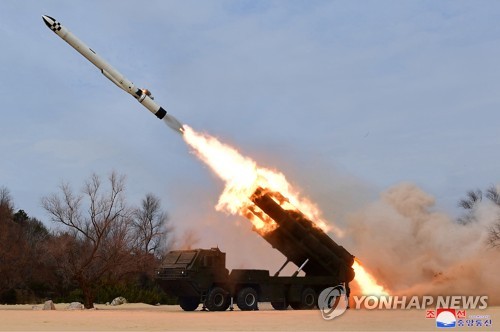(LEAD) PM orders egg farms not following food safety standards to be strictly dealt with
(ATTN: ADDS agriculture ministry's decision to conduct additional probe into farms in last 2 paras)
SEOUL, Aug. 19 (Yonhap) -- South Korean Prime Minister Lee Nak-yon on Saturday said local authorities should deal strictly with egg producers who are not complying with the government's food safety standards as he conducted on-site inspections to handle an insecticide-contaminated egg crisis in the country.
"I strongly think those who poorly manage food that is consumed by the majority of people should not be forgiven," Lee said at the agriculture ministry's office in Sejong. "There could be elements threatening food safety at every stage of production, so we must get rid of those problems this time."
For his on-site inspections, Lee first headed to Cheongju, North Chungcheong Province, for the Ministry of Food and Drug Safety's briefing on the distribution of the tainted eggs and its countermeasures. He then moved to the Ministry of Agriculture, Food and Rural Affairs' office building in Sejong to check its reports. He also visited a large discount store to listen to people's opinions.
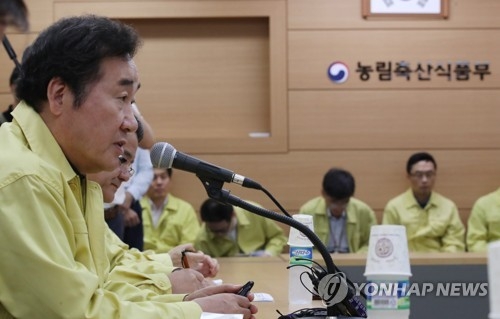
Prime Minister Lee Nak-yon (L) speaks at a meeting at the Ministry of Agriculture, Food and Rural Affairs in Sejong on Aug. 19, 2017, amid the tainted egg crisis. (Yonhap)
As of Saturday, the agriculture ministry's inspection results showed 49 farms had used illegal insecticides, and some 624.51 million eggs are produced and distributed annually from these farms, which accounted for 4.6 percent of the total eggs produced and distributed last year.
Lee ordered the ministries to learn from the current crisis. There has been a confusion over boundaries of work between the agriculture ministry and the Ministry of Food and Drug Safety, while the National Agriculture Products Quality Management Service was accused of poor handling of stamping environmentally friendly certifications for poultry producers.
"If people's trust in the government's administrative work, such as environmentally friendly certifications and the Hazard Analysis and Critical Control Points (HACCP), is damaged, this could be more painful than the current egg crisis," he said. "It's really sad that the government agencies related with food safety didn't do a good job to earn people's trust. We need to reorganize perfectly and fix the problems."
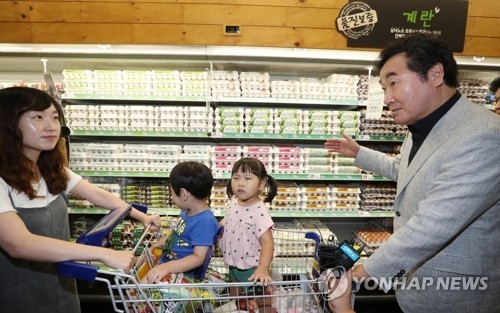
Prime Minister Lee Nak-yon (R) speaks with a South Korean citizen about egg products at a discount store in Sejong on Aug. 19, 2017. (Yonhap)
President Moon Jae-in on Wednesday ordered Lee to comprehensively oversee the egg issue and thoroughly inform the public about the inspection results. Lee said he will give clear guidelines to each ministry's job to solve the egg crisis.
"The president will talk at the Cabinet meeting Monday, but it's going to be clear what each ministry should do," he said. "I want to establish a system that can ensure food safety by creating a task force and other effective measures necessary."
Lee said that ministries should apologize for their wrongdoings even if such actions were accepted in the previous administrations.
"We have to cut bad habits from the past, and it's not right to think that this is the fault of the previous government," he said. "Even if it was done in the past, we're not free from it unless we apologize and fix the problems."
Lee said follow-up measures for poultry producers should be executed to prevent further troubles even if all tainted eggs are removed from the market.
"Probably early next week, we will see (egg) consumption getting normalized," he said.
Meanwhile, the agriculture ministry later in the day decided to conduct an additional probe into 420 farms for their possible use of illegal insecticides in producing eggs.
The decision, made at an emergency meeting attended by senior officials of major cities and provinces, came after it was found that the previous inspection into those farms didn't check if they had used some of illegal insecticides specified by the health authorities.
kdon@yna.co.kr
(END)
-
 Overdue debut of Korean abstract art pioneer Yoo Young-kuk at Venice Biennale
Overdue debut of Korean abstract art pioneer Yoo Young-kuk at Venice Biennale -
 Defense chief says N. Korea's hypersonic missile 'unsuccessful' in last-stage glide flight
Defense chief says N. Korea's hypersonic missile 'unsuccessful' in last-stage glide flight -
 Relax, immerse yourself in scents at Venice Biennale's Korean Pavilion
Relax, immerse yourself in scents at Venice Biennale's Korean Pavilion -
 N. Korea has capability to genetically engineer biological military products: U.S. report
N. Korea has capability to genetically engineer biological military products: U.S. report -
 S. Korea marks 30th anniv. of Korean Pavilion at Venice Biennale with contemporary art
S. Korea marks 30th anniv. of Korean Pavilion at Venice Biennale with contemporary art
-
 Overdue debut of Korean abstract art pioneer Yoo Young-kuk at Venice Biennale
Overdue debut of Korean abstract art pioneer Yoo Young-kuk at Venice Biennale -
 Relax, immerse yourself in scents at Venice Biennale's Korean Pavilion
Relax, immerse yourself in scents at Venice Biennale's Korean Pavilion -
 Artist Lee Bae captures ethereal Korean aesthetics at Venice Biennale
Artist Lee Bae captures ethereal Korean aesthetics at Venice Biennale -
 S. Korea marks 30th anniv. of Korean Pavilion at Venice Biennale with contemporary art
S. Korea marks 30th anniv. of Korean Pavilion at Venice Biennale with contemporary art -
 Defense chief says N. Korea's hypersonic missile 'unsuccessful' in last-stage glide flight
Defense chief says N. Korea's hypersonic missile 'unsuccessful' in last-stage glide flight
-
 Facebook page unveils photos of BTS member V in counter-terrorism unit gear
Facebook page unveils photos of BTS member V in counter-terrorism unit gear -
 Gov't likely to accept university chiefs' request to lower med school enrollment quota
Gov't likely to accept university chiefs' request to lower med school enrollment quota -
 S. Korea not invited to G7 summit meeting this year: sources
S. Korea not invited to G7 summit meeting this year: sources -
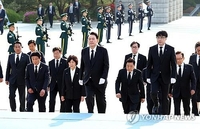 Yoon's approval rating sinks to lowest point since taking office
Yoon's approval rating sinks to lowest point since taking office -
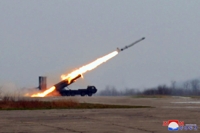 N. Korea says it conducted 'super-large warhead' test for strategic cruise missile
N. Korea says it conducted 'super-large warhead' test for strategic cruise missile















